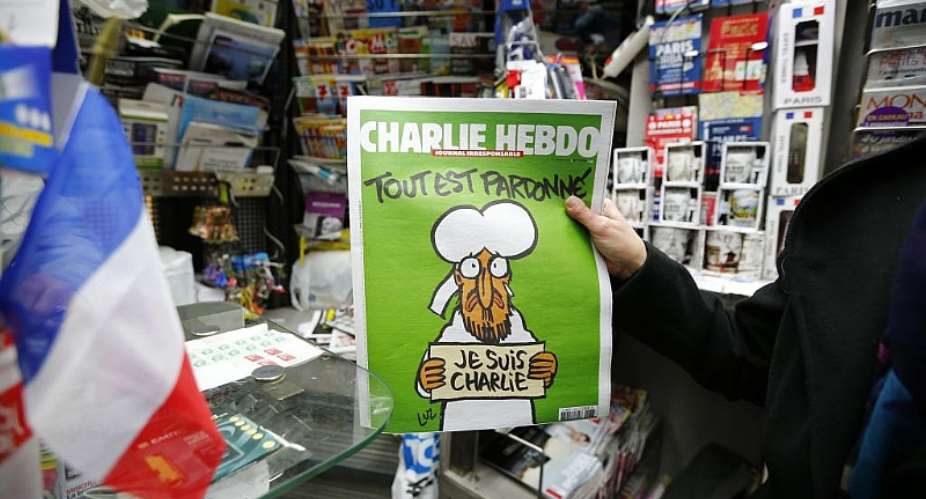This is the fourth anniversary of the terrorist attack against the offices of the satirical magazine Charlie Hebdo. Twelve people died at the hands of two radical Islamic attackers, who also killed Ahmed Merabet, a police officer who was on foot patrol near the Charlie Hebdo premises.
Four years on, the survivors who still produce the weekly paint an embittered picture of a French society which appears to have turned its back on the Enlightenment values of rationality, debate and the acceptance of differences.
“A lot of people have already given up,” says Riss, the caricaturist and current editor of Charlie, himself shot in the shoulder during the attack. His complaint is not simply that the personal tragedies have been forgotten. Riss feels that France has turned its back on what happened, that the enemy is not just religious extremism but a large part of the French intelligensia.
In the editorial of last Saturday's commemorative edition, Riss laments the fact that the situation concerning what he calls “islamic totalitarianism” has gotten worse. “Blasphemy has had babies,” he says “Everything is now blasphemous.”
The forces of darkness are making a comeback
The cover of the special edition shows a bishop and an imam trying to blow out the candle which illuminates the first edition of Charlie Hebdo immediately after the attack and its famous headline “All is forgiven”.
Inside, a double page spread shows the representatives of what the weekly calls “the forces of darkness” celebrating this sad anniversary. They include the head of the Roman Catholic Church, Pope Francis, the French far-right leader Marine Le Pen, and American president Donald Trump.
On its opinion pages, left-leaning daily paper Libération says the detractors of Charlie Hebdo seem more numerous with every passing day.
Libé says critics of the paper have forgotten that there's a distinction between blasphemy as defined by any particular religious group, and a simple determination to humiliate muslims. Charlie Hebdo is not xenophobic or racist, says the Libé article, it is simply critical of religious certainties of all shades. Blasphemy has not been a crime in France since 1881, when the chief victims of caustic caricature were Catholic clergy.
That law has been threatened in the wake of the Charlie Hebdo killings, by a form of self-censorship by the media, or in response to internet campaigns and death threats by those who feel their particular beliefs are not being respected. Any such capitulation, says Libé, will represent a posthumous victory for the killers.
Investigation complete, doubts remain
On the judicial front, the investigators have completed their work, producing 467 pages of evidence based on 20,000 interviews. The perpetrators, brothers Saïd and Chérif Kouachi were killed by police officers in the aftermath of the attack. But the French anti-terrorist authorities still have no idea who, if anybody, masterminded the whole tragic business. Before he died from injuries sustained in the final police assault, Chérif Kouachi told anti-terrorist squad members that he was acting on the orders of a senior official of the terrorist organisation Al Qaida in the Arabian Peninsula. And that the original suggestion for the attack dated from 2011. Who supplied the weapons involved remains an open question, as do the presumed links between the killers and non-radical criminal elements.
The case will come to court in the course of 2020. At least 14 people will face trial.
Charlie hanging on, but grimly
The paper continues to sell 30,000 copies every week, and has thirty thousand subscribers, but is being ruined by the security bill, currently running at one million euros per year, entirely at the publication's expense.
The most recently published company accounts show a loss for the year 2017.
Riss remains hopeful. His wish for 2019 is that the paper will continue to make readers think, give them hope, make them feisty. “We can't bow to doom and depression,” he says, “even if things remain very worrying.”





 Critics fear Togo reforms leave little room for change in election
Critics fear Togo reforms leave little room for change in election
 Flooding: Obey weather warnings – NADMO to general public
Flooding: Obey weather warnings – NADMO to general public
 Fire in NDC over boycott of Ejisu by-election
Fire in NDC over boycott of Ejisu by-election
 NDC to outdoor Prof Jane Naana Opoku-Agyemang as running mate today
NDC to outdoor Prof Jane Naana Opoku-Agyemang as running mate today
 Ejisu: CPP seeks injunction to stop April 30 by-election
Ejisu: CPP seeks injunction to stop April 30 by-election
 Dismiss ECG, GWCL, GACL bosses over losses – United Voices for Change tells gov’...
Dismiss ECG, GWCL, GACL bosses over losses – United Voices for Change tells gov’...
 Submit 2023 audited financial statements by May – Akufo-Addo order SOEs
Submit 2023 audited financial statements by May – Akufo-Addo order SOEs
 Current power outages purely due to mismanagement – Minority
Current power outages purely due to mismanagement – Minority
 ECG hoists red flag to fight Ashanti Regional Minister over arrest of General Ma...
ECG hoists red flag to fight Ashanti Regional Minister over arrest of General Ma...
 Mahama’s 24hr economy will help stabilise the cedi; it’s the best sellable polic...
Mahama’s 24hr economy will help stabilise the cedi; it’s the best sellable polic...
